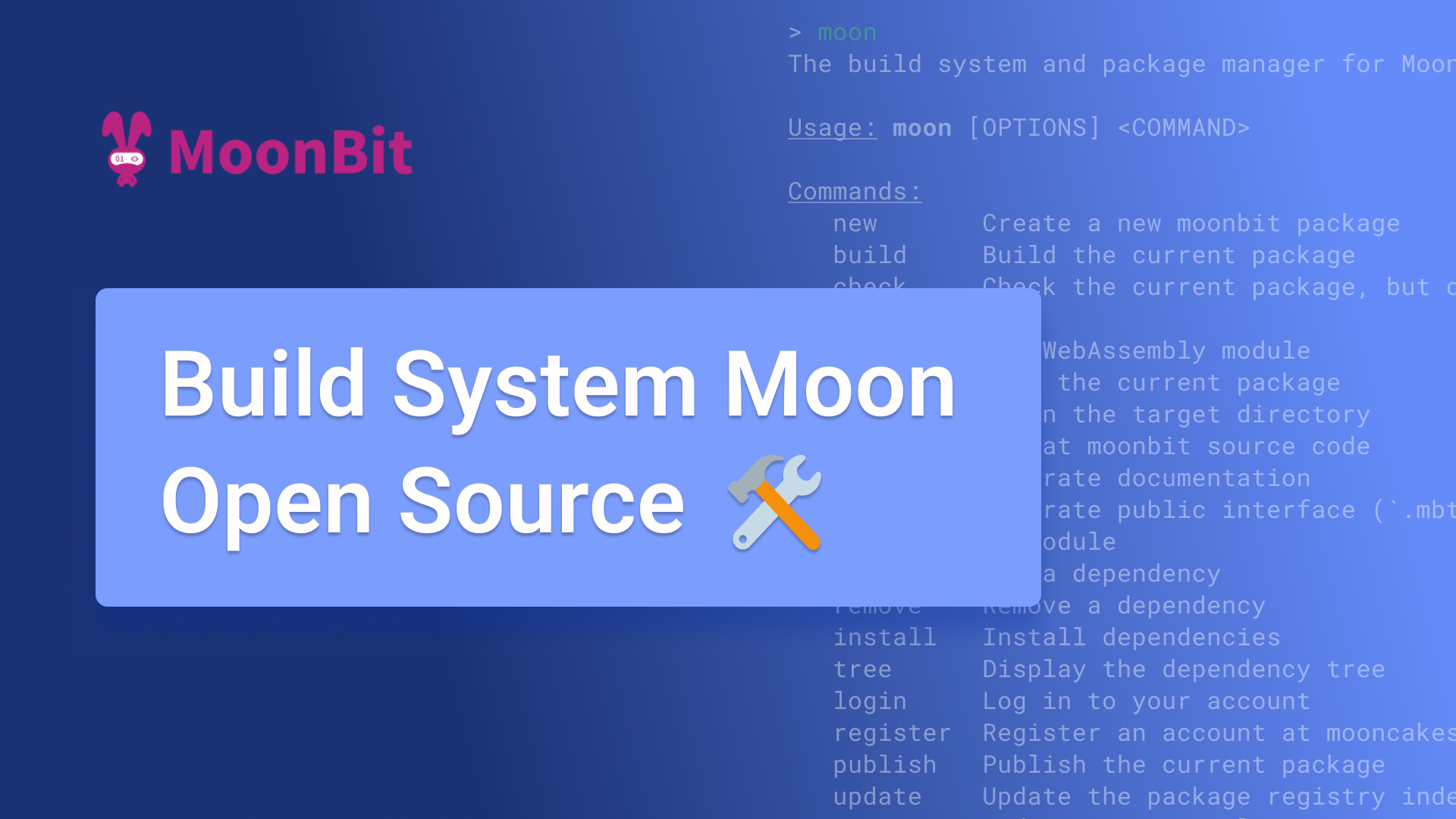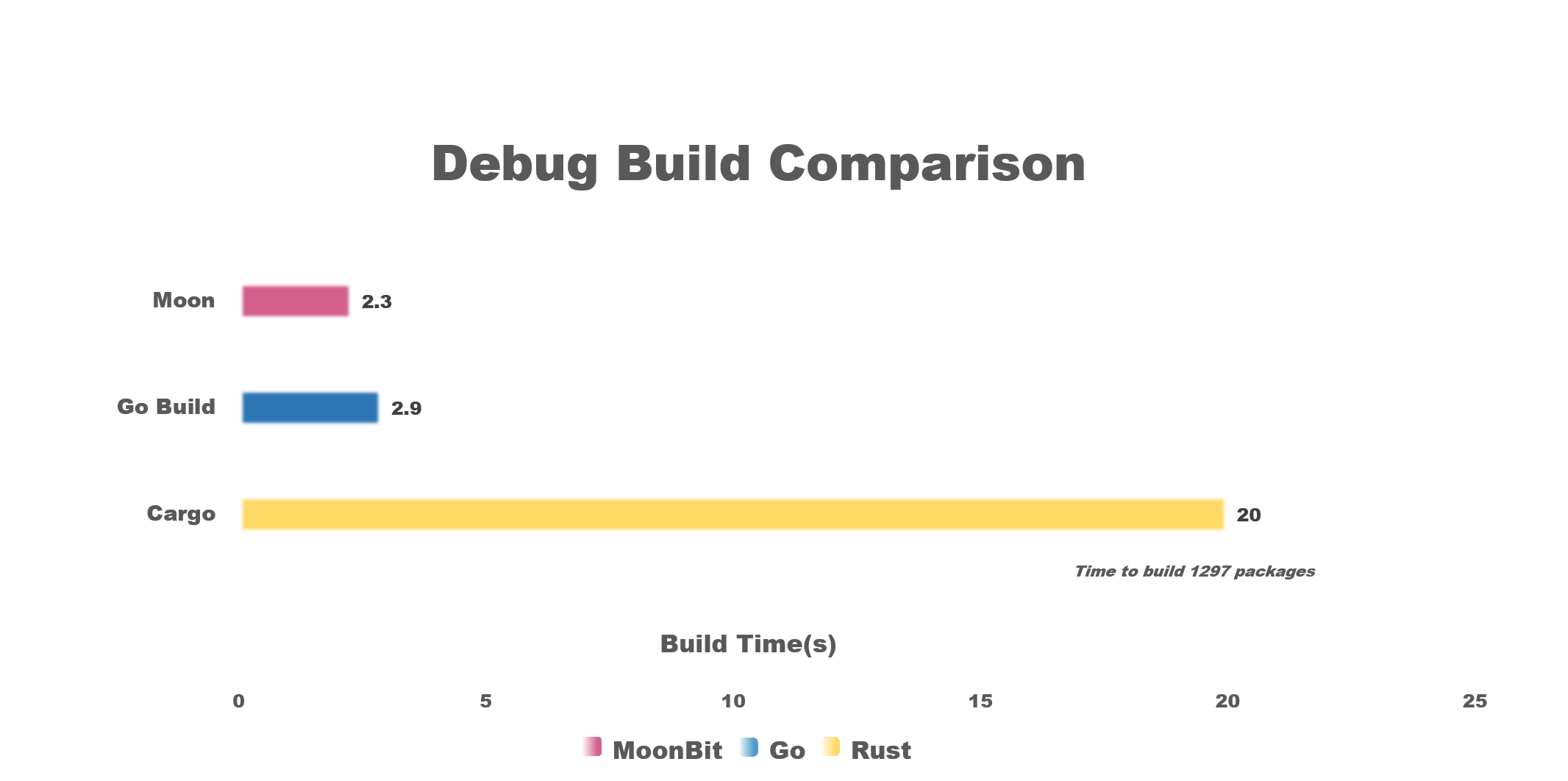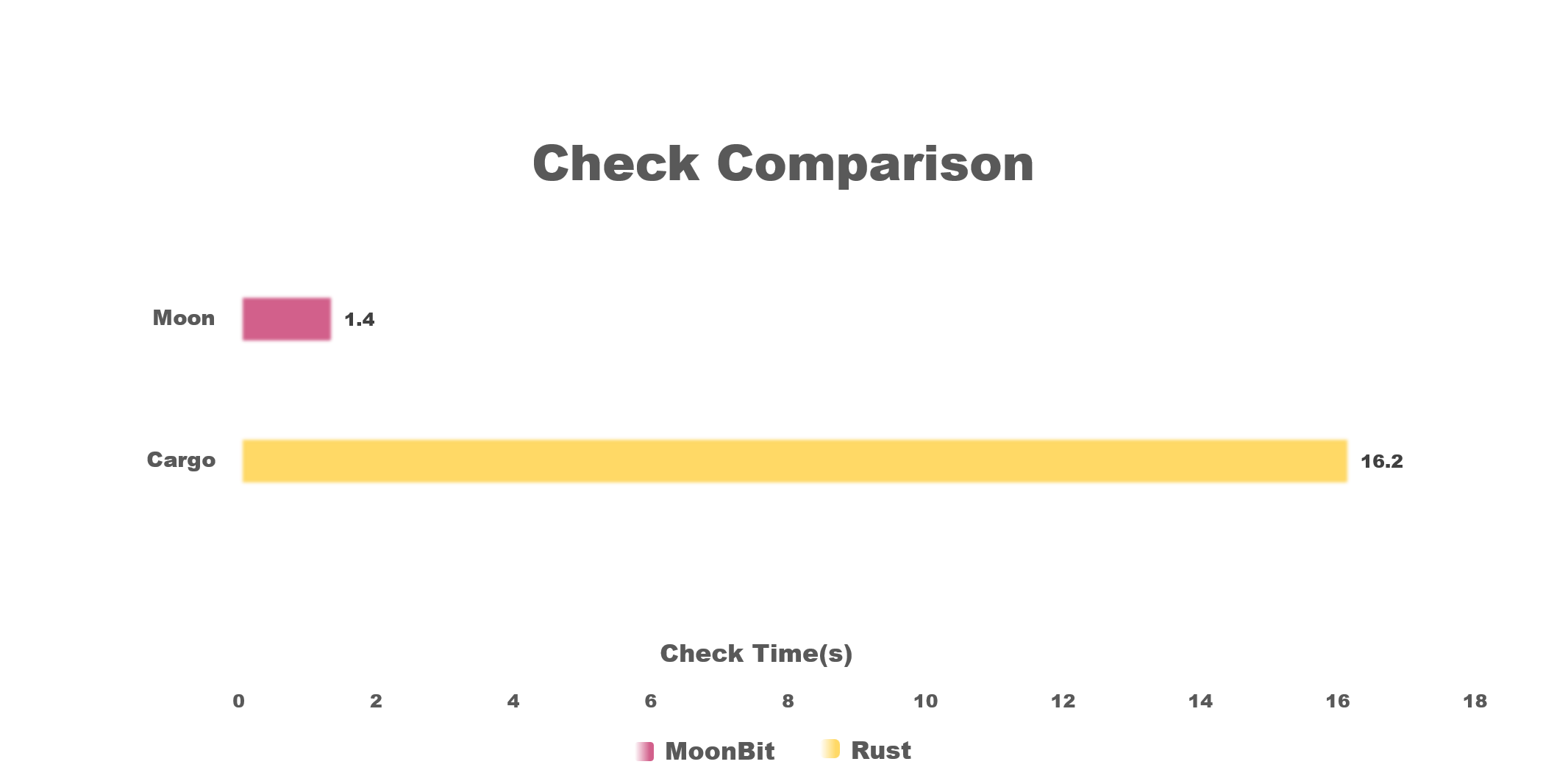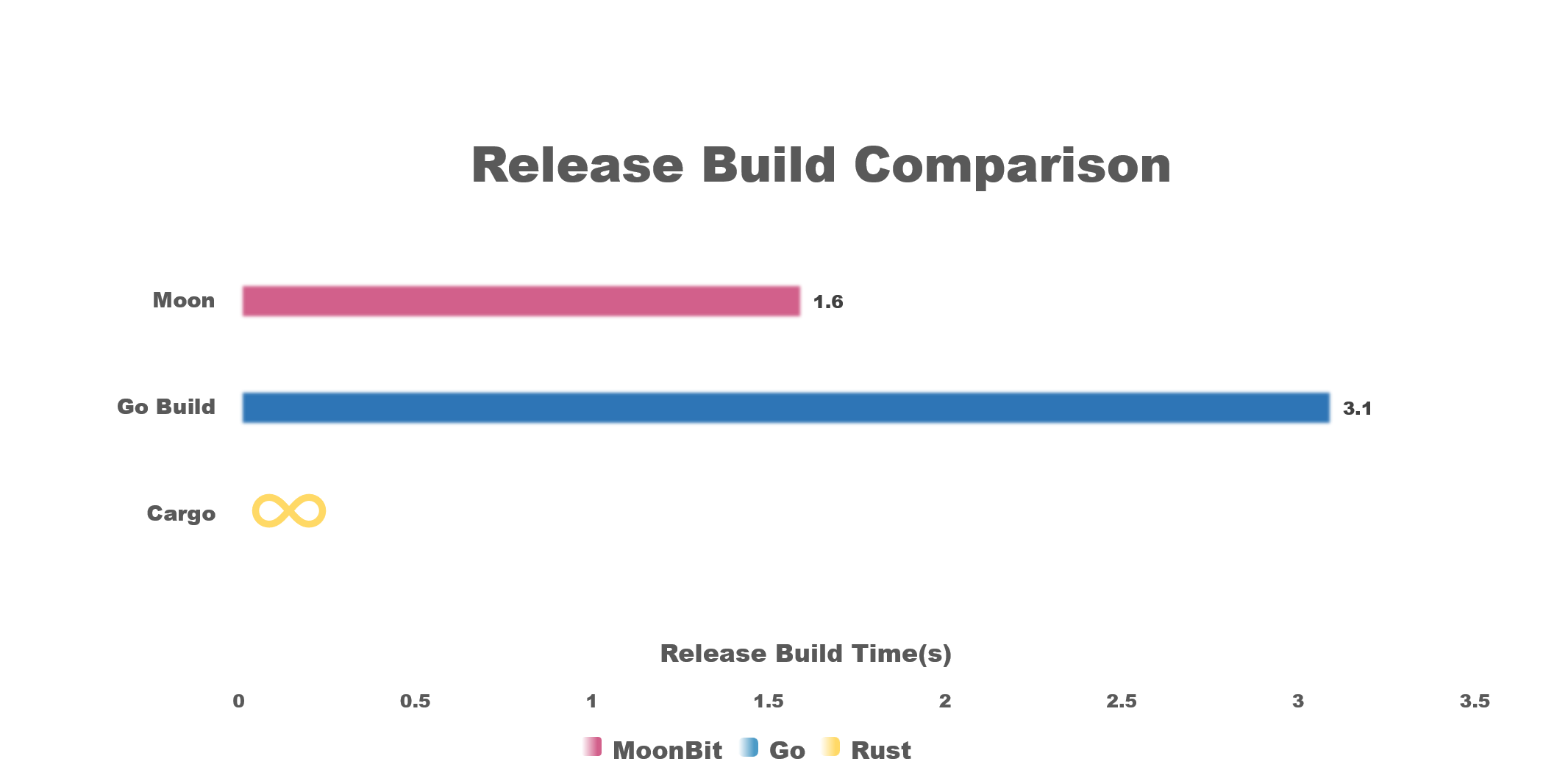MoonBit's build system, Moon, is now open source

Moon: MoonBit Build System
Moon, the build system for MoonBit, is now publicly available via the Moon GitHub repository under the AGPL License. Moon provides compilation, automated testing tools (including integrated expect test), coverage testing, package management, and more for MoonBit projects.
MoonBit integrates a comprehensive toolchain from the start, providing a streamlined coding experience with its compiler, cloud IDE, build system, package system, and AI assistant. As an essential component of the MoonBit language compilation toolchain, Moon integrates closely with the IDE, offering detailed project structure and dependency information for code analysis within the IDE.
Written in Rust, Moon benefits from Rust's memory safety, high performance, concurrency capabilities, and cross-platform support, ensuring a stable and fast build process.
Moon's parallel and incremental build capabilities are bolstered by the n2 project (both n2 and ninja were created by Evan Martin, with n2 being more lightweight and excelling in incremental builds). Modifications to n2 will maintain the original open-source license, see moonbitlang/n2.
Why Choose Moon

- Speed
MoonBit's compiler is incredibly fast due to a meticulously designed compilation process and optimization strategies. Acting as the bridge between the user and the compiler, Moon aims for a streamlined design, minimizing its own overhead to maximize compilation speed.
Additionally, Moon provides IDEs with comprehensive project structure and dependency details, crucial for latency-sensitive IDE environments. By optimizing the performance of core build steps, Moon ensures a smooth user experience ven in highly interactive development environments.
- Parallel Incremental Builds
Bolstered by the n2 project, the parallel incremental build feature of Moon is key to its efficiency. By automatically analyzing and understanding dependencies among build tasks, Moon intelligently parallelizes independent tasks, fully leveraging the power of modern multi-core processors to significantly speed up builds. Importantly, Moon only rebuilds files that have changed since the last build or have updated dependencies, greatly enhancing build efficiency and making Moon capable of handling large projects that require frequent builds.
- Integration and Testing Support
Closely integrated with automated testing tools, Moon can automatically execute unit tests, integration tests, and end-to-end tests during code submission and builds, ensuring every line of code is rigorously vetted.
For code quality assurance, MoonBit provides code formatting and static analysis tools that automatically check for consistent code styles and identify potential logical errors and security vulnerabilities. These features are especially crucial in CI/CD pipelines, allowing for early detection and reporting of code quality issues before code is merged into the main branch, ensuring the team can collaboratively develop high-quality code.
Benchmark Performance
Build Matrix Performance Testing
We tested moon against Rust's Cargo and Go's build system in compiling projects with complex dependencies. The test involves the generation of DR _ DC directories, the "directory matrix", and each directory contains MR _ MC modules, the "module matrix". The module in row r and column c of the module matrix depends on all modules in the previous row of the same directory. The first row of modules in a directory depends on all modules in the preceding row of directories.
The test setup also permits a lot of parallelism for actually executing the rules: the modules in the same row can be compiled in parallel, as well as the directories in the same row. For detailed testing criteria, see omake1, and the project generator code is available at moonbit-community/build-matrix.
In our tests, with DR, DC, MR, and MC all set to 6 and the main module, each project yields 1297 (6^4 + 1) packages. The test environment was a MacBook Pro Apple M3 Max with 128GB RAM running macOS 14.4.1. Results were as follows:

Debug Build: Moon performed excellently, taking 2.3 seconds. Go took 2.9 seconds, and Cargo was the slowest at 20.0 seconds.

Type Check: Moon was the fastest at 1.4 seconds. Cargo took 16.2 seconds. Go lacks a direct equivalent for type-checking commands like moon check and cargo check, so the result was -.

Release Build: Moon excelled again, taking only 1.6 seconds. Go took 3.1 seconds, and cargo build --release failed to complete due to memory exhaustion, resulting ∞.
Notably, Moon's release builds were faster than its debug builds.
For projects with DR, DC, MR, and MC all set to 8 (4097 modules total), moon build took 5.7 seconds, go build took 11.2 seconds, and cargo build took 1043 seconds. In this test, both Moon and Go completed in seconds, while Cargo could not finish the build within a reasonable timeframe.
Standard Library Performance Testing
Currently, moonbitlang/core is the largest MoonBit project. As of 2024/07/03, it has 38,177 lines of code, 46 packages, 195 .mbt files, and 2576 tests. Type checking the project takes only 0.28 seconds, and running all tests takes just 1.27 seconds.
Try Moon Now
Download the MoonBit toolchain via the MoonBit CLI tools installation script, or install the MoonBit plugin in VS Code and follow the prompts for one-click installation.
Usage: moon help
The build system and package manager for MoonBit.
Usage: moon [OPTIONS] <COMMAND>
Commands:
new Create a new moonbit package
build Build the current package
check Check the current package, but don't build object files
run Run WebAssembly module
test Test the current package
clean Clean the target directory
fmt Format moonbit source code
doc Generate documentation
info Generate public interface (`.mbti`) files for all packages in the module
add Add a dependency
remove Remove a dependency
install Install dependencies
tree Display the dependency tree
login Log in to your account
register Register an account at mooncakes.io
publish Publish the current package
update Update the package registry index
coverage Code coverage utilities
bench Generate build matrix for benchmarking (legacy feature)
upgrade Upgrade toolchains
version Print version info and exit
help Print this message or the help of the given subcommand(s)
Options:
--source-dir <SOURCE_DIR> The source code directory. Defaults to the current directory
--target-dir <TARGET_DIR> The target directory. Defaults to `source_dir/target`
-q, --quiet Suppress output
-v, --verbose Increase verbosity
--trace Trace the execution of the program
--dry-run Do not actually run the command
-h, --help Print helpHow to Contribute
We welcome various forms of contributions from the community, such as documentation, testing, and issues. For detailed information, please refer to the contribution guide.
MoonBit Open Source Roadmap
MoonBit was officially released last year, and we opened the standard library to the public on March 8th this year. Thanks to enthusiastic contributions from the community, a complete data structure library has been successfully implemented, further enriching the application scenarios of the MoonBit language and maturing its ecosystem. Following the open-source release of the build system, we will release the MoonBit Beta preview version on August 18th next month, marking a relatively mature stage for the MoonBit language, suitable for early users and developers to develop and test actual projects. By the end of this year, on November 22nd, the core part of the MoonBit compiler will be publically available.
Additional resources:
- Get started with MoonBit.
- Check out the MoonBit Docs.
- Learn MoonBit with the open course.
- Join our forum and Discord community.
- Explore MoonBit programming projects in the MoonBit Gallery.